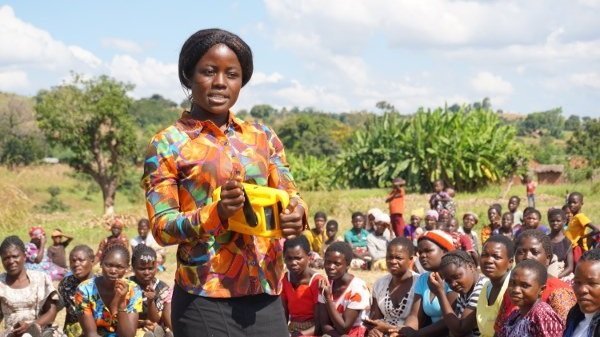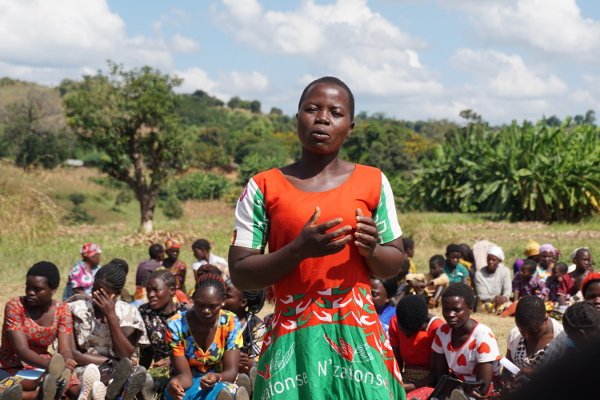In Malawi, teenage girls and young women are vulnerable to a variety of sexual and reproductive health issues.
Societal expectations, harmful myths around contraception and difficulty reaching vital health services form barriers. These affect their ability to prevent or delay pregnancy, impacting their capability to have rich, fulfilling lives.
With Women and Children First and our partners, MaiKhanda Trust and Farm Radio Trust, they are being supported through innovative, inspirational radio programmes.
During the pilot phase of the project, funded by the government of Canada, 54 community groups have been formed.
They are listening to radio programmes that discuss challenges including teenage pregnancy, contraception, and rape.
Together, the groups can identify barriers to good sexual health, and work together to implement solutions, sharing knowledge and using local resources.
In Malawi, radio remains the main source of information, with women’s literacy rates at just 55%.
Members of the Nthondo village community group and chairperson Estina Zingani (centre left)
Estina Zingani, chair of the Nthondo village community group, explains, “The programmes have helped us understand that we can overcome gender-based violence in our communities.
“Radio is empowering us with solutions. When approached by men for sex, we can ask them if they have a condom. If they do not, we are able to protect and defend ourselves, and not be taken advantage of in the way we were before.”
Mica Lam, Programmes Officer at Women and Children First, adds, “Shows signpost listeners to confidential family planning services, which play a critical role in lowering the rate of unplanned teenage pregnancies.
“This in turn means less girls drop out of school to take on child raising duties, enabling them to thrive.”
Yet a lack of access to healthcare is driving high rates of unplanned teenage pregnancy. Travelling around the rural countryside plays a huge role in this. To get to Ntchisi, the location of the nearest health centre, a 4x4 is needed to tackle the winding, dirt track that traverses the mountain range.
Mica explains, “The beautiful landscape is both a blessing and a curse. Lush forests and magnificent panoramas are strewn with steep, potholed roads. These are made worse each year by the rainy season.
“It is onerous and difficult to get there by car, requiring slowly driving in first gear. The journey is even more gruelling on foot. It is easy to see why for so many people, it is almost impossible to access health services.
“To help address this, part of the radio programming will include shows and discussions around these difficulties, prompting groups to discuss and think of solutions to this barrier.”
Community group member Rachel Kampioni (left) and chair of Mtuwanjovu group Patricia Kapolo
There is positive news. Patricia Kapolo, chair of a group in Mtuwanjovu village, has already begun to see a transition in her community.
“At first there was a misconception only married people could access contraception. I went to different communities and told them of the importance of young people using condoms.
“There was a knowledge gap. It was hard for us to share information, but now with the introduction of these activities, people understand and are getting the services.”
“The radio programme is a good initiative; people are hearing information firsthand and know it is coming from experts. They trust the information that is given to them.
“I can see there is going to be a mindset change as they continue to listen to the radio programmes. It is inevitable it will make progress in the community.”
Estina Zingani, chair of the Nthondo village community group
The pilot project ends in September, and a full roll out across three districts following until the end of 2025, with the radio programmes expected to reach thousands of young girls and boys.
When adolescent girls are mobilised to co-create solutions to their biggest health challenges, they are empowered to make informed choices about their sexual and reproductive health. This allows them to realise their rights – to survive and thrive.
These achievements are only possible thanks to our wonderful supporters.
The Innovations in Health, Rights and Development, or iHeard, project aims to contribute to the reduction of barriers to sexual and reproductive health and rights for adolescent girls and young women in Malawi. It is led by a consortium of: CODE, Farm Radio International, and MSI Reproductive Choices, with Women and Children First, and is funded by the Government of Canada.




